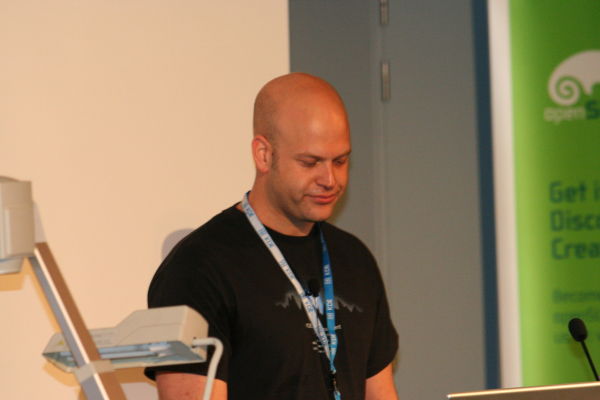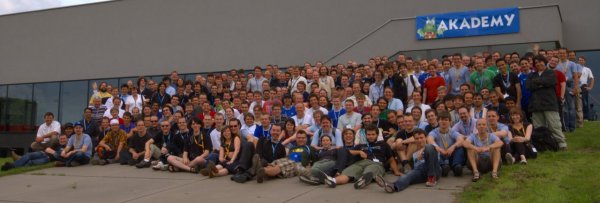Akademy 2008 - Day 1
Akademy 2008, the annual KDE desktop summit, officially kicked off on Saturday, 9th August in Sint-Katelijne-Waver, Belgium, with a schedule packed full of talks, discussions, and development. Read on for the highlights of the first day of the conference.
Friday, August 8. There is a small cafe (appropriately named "Friends Cafe") close to the train station in Mechelen - and the staff will surely remember the date. The three hosts had to draft beer and carry food like they haven't in a long time. What's so significant to a more-busy-than-usual night in a Belgian Cafe? Well, us, of course. The registration point for Akademy was just next to the cafe, and most KDE members found the beer before they found the bags and badges. After we registered and sorted through our swag, some spread out over the city looking for more food and refreshments, while others returned to one of the two hostels or various hotels for an early night. The next day was going to be very busy...
Saturday, the introduction started a little later than planned - which was good, as people still streaming in. Adriaan de Groot received immediate attention by hitting the front table with his pink whip. Yes, he had one of those motivational tools to ensure we'd listen. He then welcomed us to Akademy 2008, and gave way to Patrick Pelgrims from the De Nayer Institute who welcomed us to the campus and wished us a great time. Adriaan came back to the stage, as he had some important administrative issues. First of all, he's looking for the person who lent him 20 Euro for the train; secondly, the bikes outside are being moved to the bikeshed. Does anybody know the color of the bikeshed? We really want to know... After we worked out these urgent issues, the first keynote began.
The keynote was given by Frank Karlitschek who talked about the KDE community. In 2001, Frank founded kde-look.org, a well-known collaboration platform for KDE. Before then, artists needed to work with CVS to be able to contribute to KDE, a major obstacle to many. Thanks to the kde-look.org website, the artwork community grew from 2 to 2000 in a year. There is of course no "top-down" control - this is about power to the people; voting, discussing the artwork, and a general sense of community. In time, sharing between the different Free desktops and interconnecting them became possible.
After this history lesson, Frank started to talk about our project - KDE. And our community. He argued our community should be what makes us special - after all, it's what drives us. If you look at the default KDE desktop - you can't help but wonder: where is the community? Why isn't there a "KDE users nearby" Plasmoid? Could the agenda in Kontact be filled with local KDE and F/OSS related events? Brainstorming further, Frank talked about many other parts of KDE which could be improved to facilitate involvement from the community. Asking questions, cooperating on documents, allowing an user to become a "fan" of an application, and more direct input and communication between community members and users from within the KDE interface. And all this isn't just random ideas - far from it.
The first draft of the Open Collaboration Services Platform is already out there, and work is going into implementing this, and more! The ideas and plans were interesting and stimulated some creative discussion. The questions asked already proved this - the talk quickly turned dangerously in-depth and technical, and went in every direction imaginable. The ideas put forward in this talk will surely be the topic of many discussions during Akademy. Starting Akademy with such an original and thought-provoking talk was an incredible idea - it sets the standard for a full week of high-bandwidth, high-quality talks and discussions about new solutions to problems we didn't even realize we had just a day ago. There are so many opportunities and ideas out there - it's up to us to grab them and do something with them!
The morning saw many more talks, from Riccardo Iaconelli about Oxygen and Till Adam & Volker Krause about Akonadi to a story about large-scale KDE deployments in Brazil by Mauricio Piacentini. The vibrant atmosphere, set by the first talks, was amazing. Everyone was enthusiastic, happy to meet their fellow contributors, and immersed in interesting talks and discussions. All the presentations have been recorded, and will be online as soon as possible - check the Dot for an announcement over the coming days. The talk about the "Future of KDE Development" will have a separate article.
Between and during the talks you can find KDE developers in every corner of the building, preparing and discussing presentations or code in every language you can imagine. Alone, in pairs or small groups, behind laptops or playing with all kind of gadgets. Sitting, on chairs, behind tables, or on the floor. Of course, the "food corner" acts as a gravitational force, a place you can always find some people. Next to it is a Nokia corner, sometimes less busy but at other times buzzing with activity. We found a lost GNOME walking around, who happened to be the GNOME release manager Vincent Untz, who just attended the talk by Sebastian Kügler and Dirk Mueller about KDE development. We would like to thank Vincent for coming, and for his great input. Vincent also gave a talk about FreeDesktop.org collaboration, and joined us for beers and more talk in the evening.
After lunch, we listened to another keynote, this time from Nokia's Sebastian Nyström about deepening KDE and Qt collaboration. While we waited for him to start talking, the screen was filled with a huge "Qt loves KDE" slogan. Trolltech as an entity is no more - it is now "Qt Software" (yes, still pronounced "cute"), continuing as an internal Nokia endeavor.
After introducing Nokia (with a slogan of "connecting people") and its colorful history, Sebastian turned to Nokia and its relationship with open source software. He pointed out Nokia greatly believes in F/OSS, and wants to learn how to work with a community. This was definitely a factor in their acquisition of Trolltech - the symbiotic relationship between Trolltech and KDE is very interesting. Nokia plans to take full advantage of the capabilities Qt brings with it - the power of Qt means easier deployment across devices. Trolltech also brought in great developers, and the KDE community provides even more access to a range of smart hackers. As Sebastian puts it - no matter how big you are, not all smart people in the world work for you.
Besides, the aims of KDE and Nokia align very well - their work on the desktop, integrating online data and the desktop - these things are of great interest to both. Nokia will continue to sponsor people and projects, and want to become more active within KDE. Sebastian tells us Nokia realizes they have made mistakes in the past - and they are sorry for their behavior. Currently Nokia is looking for a conversation: how can we help you reach your goals as a community?
Here Sebastian describes the opportunities for KDE:
- Nokia wants to do a long-term investment in KDE
- Nokia offers a potential whole new market for KDE: with over 30 devices sold every second, there is a huge opportunity
- And of course, Nokia needs good engineers, and we've got plenty of those. As became clear during the questions, Nokia not only allows their developers to work some paid hours on F/OSS projects, but also doesn't consider the work they do in their free time to be "owned" by Nokia.
The keynote ended with a request from Nokia: How can we continue to develop together to drive innovation faster?
The Nokia keynote wasn't the only presence from Nokia - besides them being the Platinum sponsor and sponsoring the food & drinks at the Saturday evening social event, and few guys wearing Nokia t-shirts. A short talk with one of them revealed they were Nokia engineers who volunteered to visit Akademy to mingle with the KDE community. We would have a much harder time identifying them tomorrow, he promised, as they wouldn't wear their Nokia t-shirts anymore... the assimilation has begun!
Nearing the end of the day we all gathered outside for the group photo. As usual, it was a little painful, more so than last year, due to having more visitors than ever. Yes, this year Akademy crossed the 300 contributors threshold - and still everything is going quite smoothly. After the picture had (finally!) been taken, it was time for the first social event at the "Het Anker brewery". Then they day ended, though later for some than for others! Most people we talked to said it had been very productive - let's see if we can top this tomorrow...

